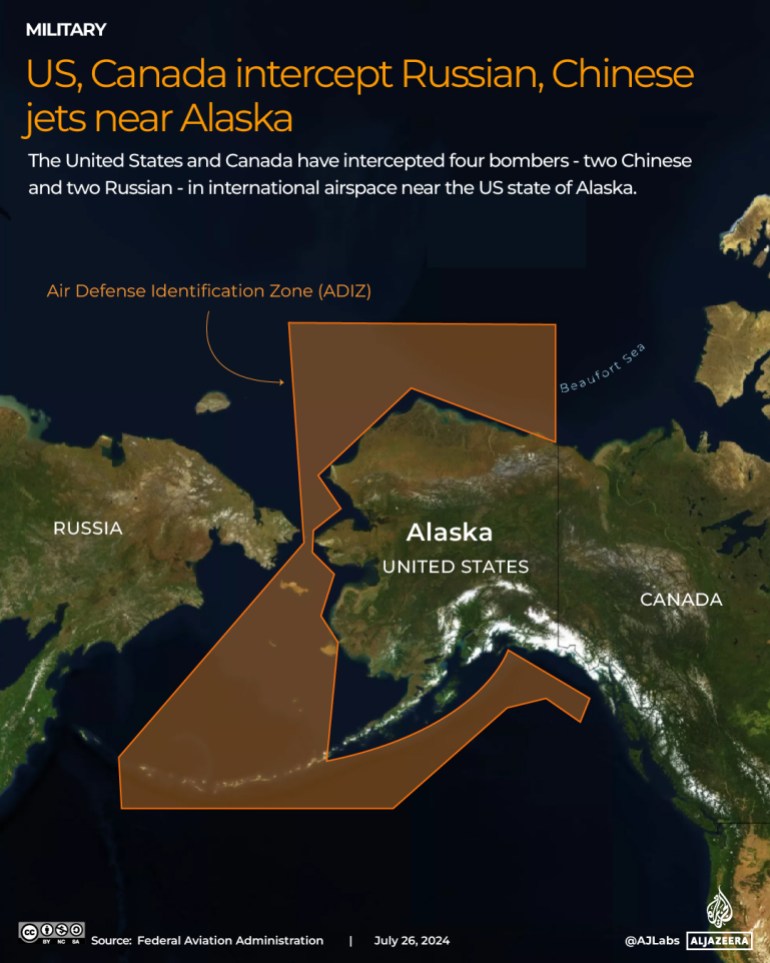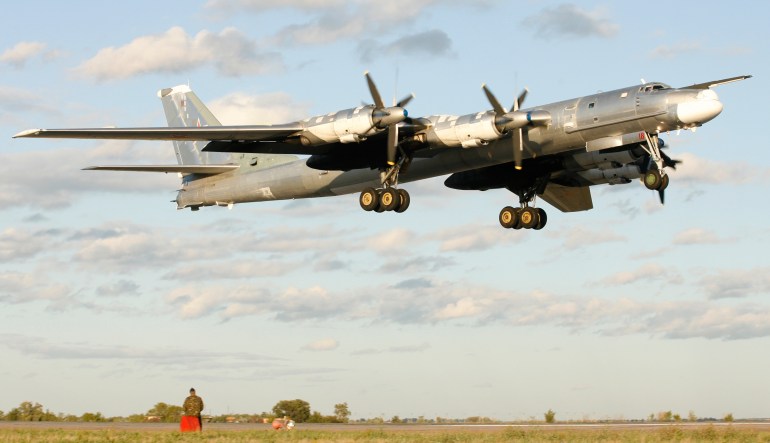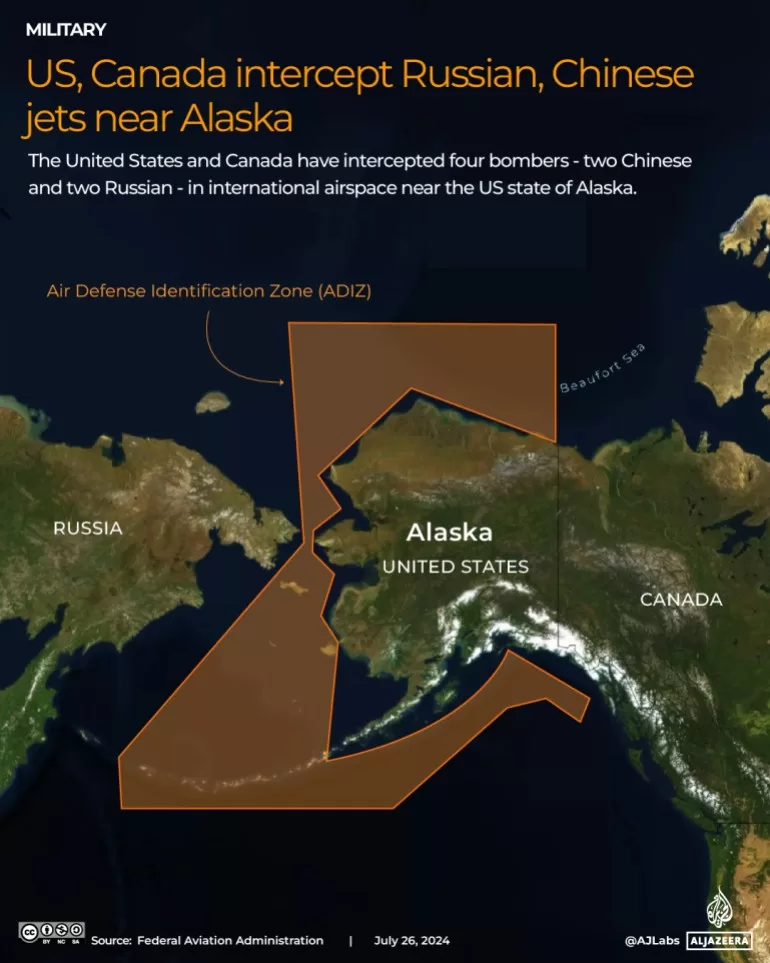EXPLAINER
The joint flight highlights growing military cooperation between the two countries, sparking concerns in the US.
The United States and Canada this week intercepted two Chinese bombers and two Russian bombers operating in international airspace near the US state of Alaska.
It’s the first time that Russian and Chinese bombers are known to have flown together over the North Pacific, indicating an expanding military cooperation that has raised concerns among the US and its allies.
So what’s going on, and what do we know?
What happened and when?
- On Wednesday, US and Canadian fighter jets detected, tracked and intercepted two Russian Tupolev TU-95 strategic bombers and two Chinese H-6 bombers.
- The North American Aerospace Defense Command said the four bombers did not enter US or Canadian sovereign airspace and were not perceived as a threat.
- In a Thursday news conference, US Defense Secretary Lloyd Austin described the joint bomber flights as “not a surprise” and said China and Russia may have been planning them for some time.
- The joint flight lasted longer than five hours, the Russian Ministry of Defence said, and the exercise prompted the US and Canada to carry out an intercept. This is an exercise in which a country flies its jets alongside foreign aircraft to demonstrate its defensive capabilities.
- “This is the first time that we’ve seen these two countries fly together,” Austin said.
.@NORADCommand employed a layered defense network of fighter aircraft, satellites, and ground-based and airborne radars in seamless interoperability to detect, track, and intercept two Russian TU-95 and two PRC H-6 military aircraft operating in the Alaska ADIZ on July 24, 2024. pic.twitter.com/YvG1cu31Ni
— North American Aerospace Defense Command (@NORADCommand) July 25, 2024
Where were the Russian and Chinese planes intercepted?
- The strategic bombers were detected, tracked and intercepted within Alaska’s Air Defense Identification Zone (ADIZ).
- An ADIZ is a larger area than airspace that is claimed by an individual state and is considered international airspace. Unlike sovereign airspace, ADIZs are not recognised in international law or overseen by any international body.
- According to the US, the closest point of approach was about 320km (200 miles) off its coast.
- Russia’s Ministry of Defence said the teams carried out an air patrol over the Chukchi Sea, Bering Sea and the northern part of the Pacific Ocean.

What are the Russian TU-95 and the Chinese H-6?
- Both are strategic bombers with Cold War-era Soviet designs. The Russian TU-95 is the only propeller-driven strategic bomber still in operation today.
- Both are nuclear payload capable with a theoretical unlimited range due to aerial refuelling. Currently, their upgrades allow both to use cruise missiles and other precision-guided munitions.
- The Xi’an H-6 is based on the Soviet era Tupolev-16.

Why was this joint flight significant?
- The joint exercise marks a further expansion of the countries’ military cooperation. Although both countries do not have a defence treaty, they have been collaborating for years.
- Both countries conducted their first strategic bomber patrol in 2019, and since then, military exercises have become more frequent. This is the first time both have flown near the US.
- “China’s boosting its capabilities to carry out effective strategic gaming with the US and to maintain strategic stability,” Shen Yi, a professor of international politics at Fudan University in Shanghai, wrote in a column, according to The Associated Press news agency.
- “As this system continuously improves, it can effectively deter the US,” Yi added.
- When asked on Thursday if the interception was a case of Russia and China “testing” the US, Austin replied two countries “are constantly testing us”.
- Previously, the US has expressed concern over the growing cooperation between China and Russia near the Arctic region, arguing that this could threaten regional stability.
What have been the reactions?
- Alaska Senator Dan Sullivan in a statement described the flights as an “escalation”.
- “Alaska continues to be on the frontlines of the authoritarian aggression by the dictators in Russia and China who are increasingly working together,” Sullivan said while urging the US to enhance its military capabilities and necessary infrastructure to counter the two countries in the Arctic.
Today, @NORADCommand intercepted two Russian & two Chinese bombers operating in Alaska’s Air Defense Identification Zone (ADIZ).
Alaska continues to be on the frontlines of the authoritarian aggression by the dictators in Russia and China who are increasingly working together.…
— Sen. Dan Sullivan (@SenDanSullivan) July 25, 2024
- Chinese Ministry of National Defence spokesperson Zhang Xiaogang said this was the eighth strategic air cruise organised by the two militaries since 2019.
- “The operation does not target a third party, is in line with international law and practice, and has nothing to do with the current international and regional situation,” Zhang said during the ministry’s monthly news conference.
- According to a report by the US Naval Institute, the Russian Ministry of Defence referred to Wednesday’s flight location as a new area of joint operations, indicating that the countries plan to regularly conduct such activities in the North Pacific and Bering Sea near US territory.
